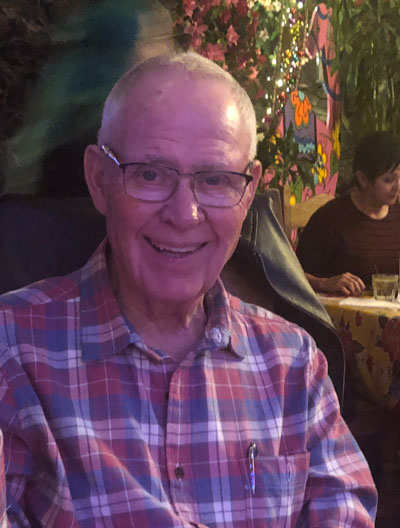
6-Year Pancreatic Cancer Survivor Wayne Mullis Maintains Strength Despite Ongoing Challenges
Updated by Julia Barbant
December, 2024
Diagnosis: September 2018
Status: No Signs of Active Cancer
Wayne Mullis of Scottsdale, Arizona, is not one to let pancreatic cancer define his story, even as the disease continues to challenge him almost six years after his diagnosis. Instead, Wayne chooses to embrace and appreciate each day he has, keeping a close eye on his evolving condition while maintaining hope and optimism for whatever lies ahead.
Diagnosed with pancreatic cancer in September 2018 after experiencing persistent digestive issues, Wayne underwent chemotherapy and radiation at the advice of his doctors until January 2019, when his care team determined his tumor had shrunk enough to make him a candidate for surgery. After a Whipple procedure, which involves an extensive “replumbing” of most of the digestive system, Wayne enjoyed several cancer-free years until a scan on his five-year diagnosis anniversary revealed a growth on what remained of his pancreas.
Wayne had about 35% of his pancreas removed during that 2019 Whipple procedure, a surgery that became necessary after doctors determined that the ongoing digestive issues Wayne initially thought might be irritable bowel syndrome were actually the result of something more serious. An endoscopy led to the diagnosis of pancreatic cancer, and Wayne soon met with Dr. Erkut Borazanci, M.D., at Scottsdale’s HonorHealth Research Institute, to determine next steps.
Undergoing Innovative Treatment
Dr. Borazanci, or Dr. “B,” as many of his patients refer to him, chose to have Wayne undergo “neoadjuvant” therapy, which, in this case, involved the combination of stereotactic body radiation therapy and chemotherapy using gemcitabine, cisplatin, nab-paclitaxel and paricalcitrol (Vitamin D) ahead of Wayne’s surgery.
The neoadjuvant therapy regimen worked as intended and Wayne’s surgeon, Dr. Albert Amini, M.D., performed Wayne’s Whipple surgery Jan. 4, 2019.
“I was told it was the best possible result—that the pathology was excellent,” Wayne said. “The doctors told me, ‘You don’t have any signs of active cancer.’
Wayne spent eight days recovering in the hospital, but the surgery proved highly successful, leading to five cancer-free years in its aftermath. However, doctors identified a concerning spot on Wayne’s pancreas at his five-year follow-up appointment. After time and observation, they deemed it “high-grade dysplasia,” meaning they considered it a precancerous condition with a high likelihood of developing into cancer over time.
Wayne’s care team has kept a close eye on the spot, and after noticing some growth, they told Wayne he’d likely need to remove what remains of his pancreas or face a 95% chance of his cancer coming back. While nothing is set in stone at the moment, Wayne expects that he will likely have what’s left of his pancreas surgically removed sometime in January or February 2025.
Maintaining Normalcy Amidst Uncertainty
In the meantime, Wayne will continue to live life as he knows it, and he does his best to maintain a sense of normalcy despite his health challenges. He takes CREON, a digestive enzyme, with meals to help with digestion, and he walks about three miles four or five times a week to stay active and keep his strength up in case he needs to go back under the knife. He also sees his doctors regularly so they can monitor all aspects of his health and catch any developing issues promptly.
Wayne’s proactive approach to his health highlights his determination to take life one step at a time. As someone who’s navigated the highs and lows of a pancreatic cancer diagnosis and treatment, Wayne has valuable insight to share with others facing similar health hurdles. For example, he encourages anyone facing a pancreatic cancer diagnosis to find out everything they can about the condition. He also urges them to accept help from family members and loved ones who offer it, acknowledging that, for some, this can be difficult.
Wayne also encourages people facing pancreatic cancer to maintain hope, regardless of what lies ahead.
“You’ve got to have a little faith,” he said. “I’ve been a busy man all my life, and I told myself, ‘I’m going to beat this thing if it’s beatable.’ But you have to have a dose of reality, too – I consider myself very lucky; I’ve spoken to other people who have it [pancreatic cancer] and tell them about my good luck, and that there’s hope. And I’m, by and large, an example of that.”
Balancing Optimism With Realism
Wayne also sees hope in new and emerging treatment methods but acknowledges that the medical community still has a long way to go when it comes to identifying and treating the disease during its early stages, when treatment is often most effective.
“They’re developing new things and on the cusp of making some major progress in terms of saving the lives of people with pancreatic cancer,” Wayne said. “The big problem, though, is early detection. This is a critical part of managing the disease.”
Wayne’s sentiments also serve as a reminder of the delicate balance between optimism and realism.
“If you have any sensibilities at all, you’re thankful for every day you have after a diagnosis,” Wayne said. “I’m almost 85 years old, and I’m happy to have made it this far. Pancreatic cancer has a bad reputation of being fatal – when you find out you don’t have it anymore, you’re most appreciative, and you try to live the best way you can. That’s the bottom line.”
Wayne continues to monitor his condition and is working closely with his care team to determine next steps.



So happy you are better. How old are you?